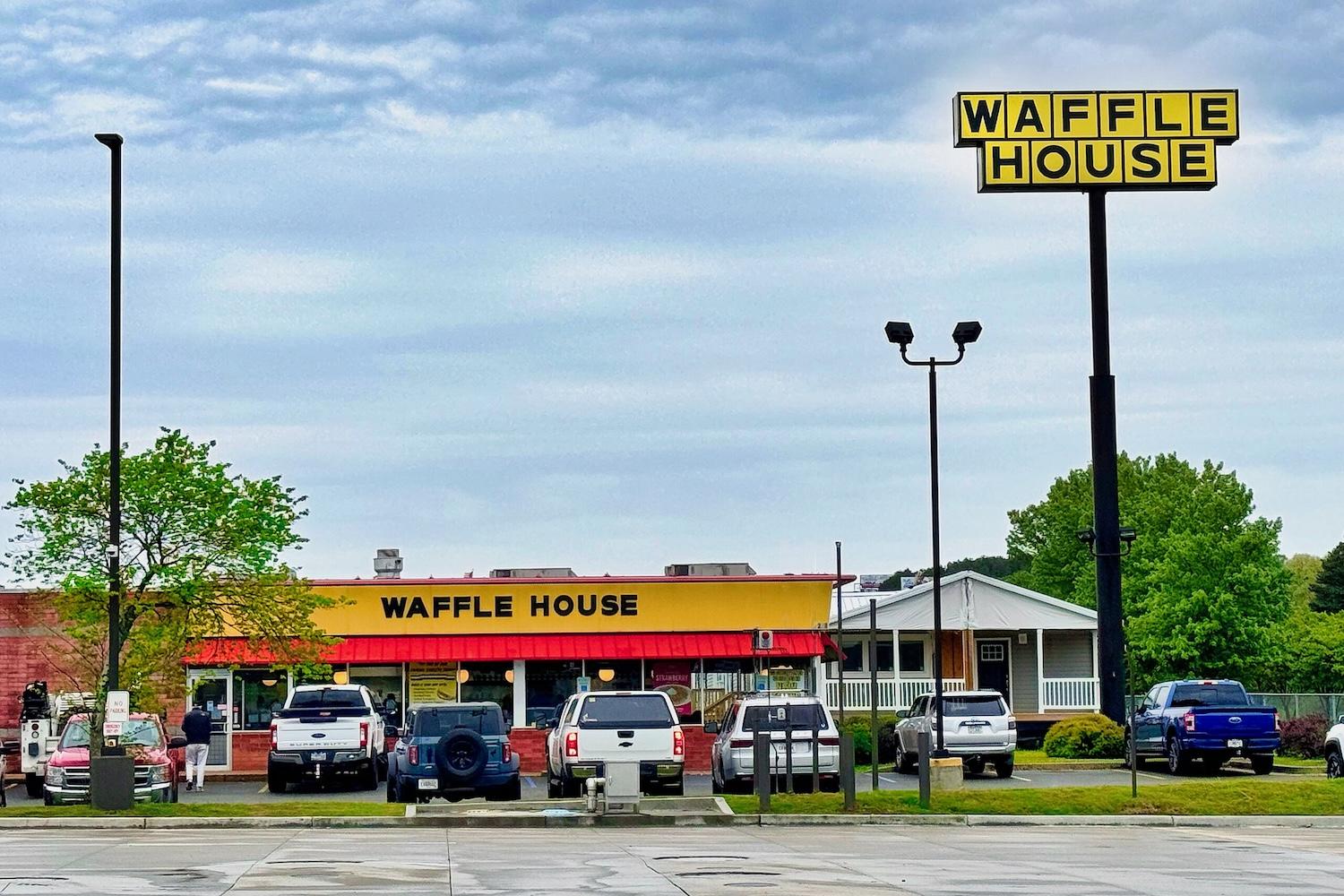
A Waffle House in Jasper, Georgia. (Image: Harrison Keely/Wikimedia Commons)
Waffle House has earned a reputation for supporting communities during disaster recovery efforts. So much so that the U.S. Federal Emergency Management Agency (FEMA) started using the "Waffle House Index" as an unofficial metric to measure storm severity back in 2011, a nod to the company’s ability to re-open stores quickly in the aftermath of a natural disaster.
Now, the beloved roadside restaurant chain is establishing itself as a rallying point of a different sort. Waffle House is welcoming drivers to the vehicle electrification movement by installing EV charging stations at dozens of restaurants throughout the U.S. South and Southeast.
The new Waffle House Index
Electric vehicles (EVs) have been a target of far-right pundits and politicians going back to the early 2000s. When Republican President Donald Trump took office earlier this year, he suspended funds for new charging stations from the NEVI (National Electric Vehicle Infrastructure) initiative, and with his support, the Republican majority in Congress is on track to eliminate tax credits for EVs.
In that context, Waffle House’s decision to launch a new EV charging plan is a bold step, especially for a Southern-style restaurant closely identified with politically conservative U.S. states. When an iconic brand like Waffle House embarks on an ambitious EV charging plan, it is a strong indication that the vehicle electrification movement has broad appeal, regardless of the politics of the moment.
Waffle House laid the groundwork last year when it announced funding through NEVI to install four EV charging ports at a restaurant in Lakeland, Tennessee. Rather than continuing to rely on federal funding, the company formed a partnership with the BP Pulse branch of the leading oil and gas producer BP to install EV chargers at Waffle House restaurants in Florida, Georgia, Texas, and other parts of the South and Southeast. The initial launch includes 50 restaurants, with the first chargers set to power on next year, the trade publication CSP News reports.
EV charging and brand reputation
Waffle House contributed a statement to a BP Pulse press announcement about the new chargers late last month, in which it underscored its new role as a brand ambassador for vehicle electrification.
“Waffle House is thrilled to collaborate with BP Pulse to offer our customers a safe, well-lit and welcoming place to enjoy Good Food Fast any time of day,” David Repp, the company’s director of innovation, said in the statement, referencing the chain's "good food fast" motto. “Charging up while fueling up on an All-Star Special will be convenient and fast — a perfect option for enjoying the Waffle House experience while charging your EV on the go."
In addition to attracting EV drivers, the company's charging ambitions fill a gap in its detailed disaster response plans. The original “Waffle House Index” refers to the company’s ability to stay open or reopen quickly in the aftermath of a weather emergency, offering food and a dry place to rest. The chain has honed a disaster response playbook since Hurricane Katrina in 2005, tracking storms for days in advance and storing essentials like ice outside the danger zone.
The missing piece is fuel for customers’ cars. Waffle House does not offer fuel, and the installation of new fuel pumps at existing locations would be impractical if not impossible. In comparison, EV charging stations are more compact and require less new infrastructure, giving Waffle House a new opportunity to provide a service to drivers who may have lost power at home.
The Waffle House EV charging plan is also simply good business. Other restaurant brands like Subway are also installing EV chargers, seeking to attract a new generation of younger drivers. Convenience stops like Circle K and 7-Eleven are also supporting the vehicle electrification movement, leveraging their locations on or adjacent to highways.
The new Waffle House Index: Getting EV charging right
Waffle House's plan for EV charging stations also reflects the company’s attention to customer needs. Each restaurant on the list will install six fast-charging stations with a mix of connectors so drivers can charge up in the time it takes to finish breakfast regardless of their EV's make and model, according to BP Pulse.
Market research bears out driver preferences for fast charging at restaurants. The Transportation Energy Institute issues quarterly reports on the average monthly use of public charging stations in the U.S. and Canada. Its most recent report released this month indicates that while EV charging increased at both convenience stores and restaurants last year, restaurants have an advantage. Since they're more likely to offer fast charging, restaurants consistently see their chargers used more often, the report found.
But Waffle House’s embrace of EV charging does bear some risk. Public EV charging stations have improved in recent years, but drivers can still encounter damaged or inoperable stations when seeking a charge. The 50 initial stations are scheduled to come online next year, and it will be up to both Waffle House and BP Pulse to ensure that drivers experience smooth, reliable charging sessions at the iconic diner.

Tina writes frequently for TriplePundit and other websites, with a focus on military, government and corporate sustainability, clean tech research and emerging energy technologies. She is a former Deputy Director of Public Affairs of the New York City Department of Environmental Protection, and author of books and articles on recycling and other conservation themes.














